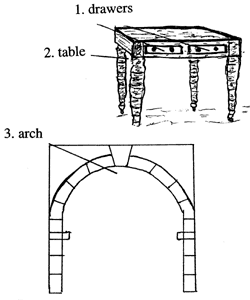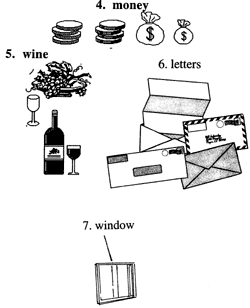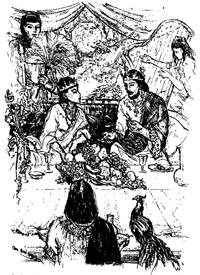Unit 18: Nouns Ending In -ing, -ed, Or -er
Pictured Words
New Words

| 1. drawers
|
| 2. table
|
| 3. arch
|

| 4. money
|
| 5. wine
|
| 6. letters
|
| 7. window
|
Nouns
Adjectives
Sayings
Our cooking table is made of wood.
Many questions may be under discussion at the family table.
Drinking wine may give us pleasure, but is it healthy?
It may be causing us the loss of a lot of money.
Her hair is long and beautiful.
She is dependent upon sweet oils for its soft feeling and color.
A house may have many windows but few arches.
From an open window we seem to see the view more clearly.
Nouns Ending In -ing, -ed, Or -er
About half the nouns in this course may have the endings -ing, -ed, or -er.
If the ending is -ing, it is an action;
If the ending is -ed, it is the thing receiving the action.
If the ending is -er, it is the doer of the action.
Nouns with -ing
| train
| give ear to the training of your father.
|
| live
| let us overcome them living.
|
| run
| their feet are running after evil.
|
| cry
| Wisdom is crying out in the street.
|
| sound
| her words are sounding in the meeting places.
|
| laugh
| In the day of trouble I will be laughing.
|
Nouns with -ed
| train
| to be trained in the ways of wisdom.
|
| mind
| to make the simple-minded sharp.
|
| stretch
| to no purpose is the net stretched out.
|
| guide
| the man of good sense will be wisely guided.
|
| control
| you were not controlled by my guiding.
|
| store
| he has salvation stored up for the upright.
|
Nouns with -er
| hate
| a delight to haters of authority.
|
| sin
| the evil designs of the sinner.
|
| rule
| having no chief overseer or ruler.
|
| wise
| give teaching to a wise man and he will become wiser.
|
| work
| the hand of the ready worker gets in wealth.
|

The Queen Of Sheba
Now the queen of Sheba, hearing great things of Solomon, came to put his wisdom to the test with hard questions.
She came to Jerusalem with a very great train, with camels weighted down with spices, and stores of gold and jewels: and when she came to Solomon she had talk with him of everything in her mind.
And Solomon gave her answers to all her questions;
there was no secret which the king did not make clear to her.
When the queen of Sheba had seen all the wisdom of Solomon, and the house which he had made, and the food at his table, and all his servants seated there, and those who were waiting on him in their places.
She said to the king, The account which was given to me in my country of your acts and your wisdom was true.
But I had no faith in what was said about you, till I came and saw for myself;
and now I see that it was not half the story;
your wisdom and your wealth are much greater than they said.
Happy are your wives, happy are these your servants whose place is ever before you, hearing your words of wisdom.
May the Lord your God be praised, whose pleasure it was to put you on the seat of the kingdom of Israel because the Lord's love for Israel is eternal, he has made you king, to be their judge in
She gave the king a hundred and twenty talents of gold, and a great store of spices and jewels: never again was such a wealth of spices seen as that which the queen of Sheba gave King Solomon.
Additional Reading
Sheba was a country south of Israel.
It was a place from which much gold came.
In fact, when the Queen of Sheba came to see Solomon, she came with gold to the value of three and one half million dollars (120 talents in the measure of the Jews).
She also gave him a great store of spices and jewels.
The land of Sheba had a store of such products and so was very powerful.
So the Queen was a person of substance.
It shows that Solomon was also a very important ruler.
He was seen as a person to be given respect because of the beautiful Temple he had made in Jerusalem and for his great wisdom.
He was able to give answers to all the hard questions the Queen put to him.
There have been many discoveries made at Sheba.
Men who are experts on old buildings have made many discoveries there, from which they have become certain of where the place was.
They have been able to unearth a religious building for the moon-god, so there is agreement that the Queen was not a woman who gave respect to the God of Israel.
She came because of the respect she had for Solomon.
And she was happy with what she saw.
As she said, only half had come to her ears in her distant land.
Solomon was king for 40 years, a long time before Jesus came.
In fact, it was about 1000 years before, in 970 B.C..
Solomon made it his first business to make the Temple.
He had a desire to see it greater and more beautiful than any of those in lands where other Gods were given attention.
He did that in the first 12 years of his rule and he put gold and silver into its building to the value of four billion dollars.
It was a time when the land of Israel was a great nation with frequent journeys to other far distant lands.
It was also a time of peace.
Experts on the weather of olden days tell us that the weather was good, with frequent rain and fertile conditions for farmers.
The earth was warmer then than it was later on.
In fact, 400 years later, at the time of the prophets, the weather was much colder and harder for farmers, they say.
In other parts of the earth, like in China, the weather picture was the same.
This was because the earth was warmer in 1000 B. C.
and got colder slowly over the next six hundred years.
Farming was very important to all men because their food came from the produce of the land, especially in olden times.
No doubt, the good times in the Queen of Sheba's day made it possible for so much money to be put into the Temple at Jerusalem by Solomon.
And this seems to have been done without great hardship for the people.
It was a happy time of peace and power.
Helpful Notes
| train
| the persons and animals coming behind.
|
| spices
| special, strong-smelling goods.
|
| seat of the kingdom
| the place of control.
|
| judge in righteousness
| right division of authority.
|
| experts
| able men of knowledge.
|
| B.C.
| a way of saying when things happened - B.C.= before Christ.
|
| billion
| a very large number or sum of money.
|
| produce of the land
| things grown for food and business.
|
| hardships
| poor conditions of living.
|